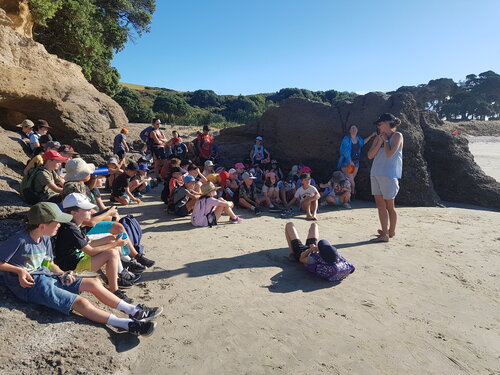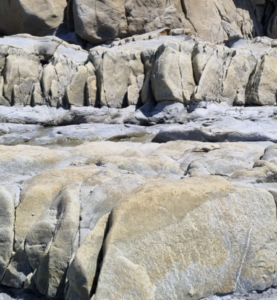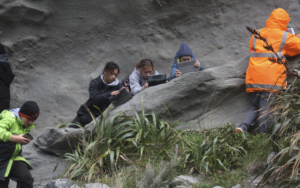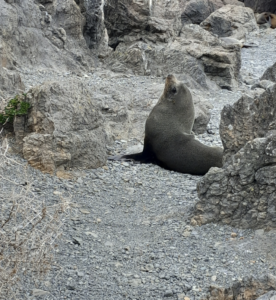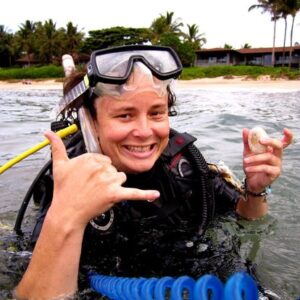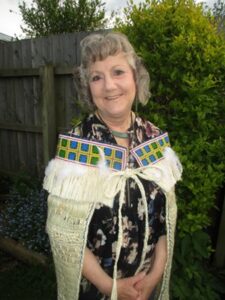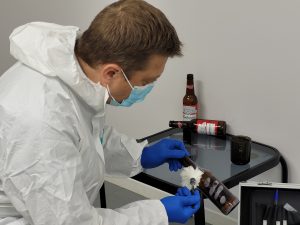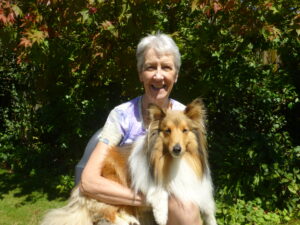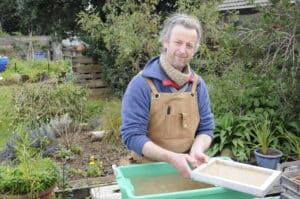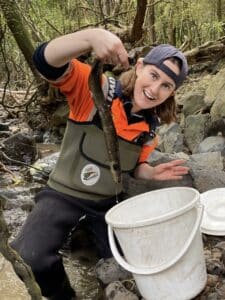Kaipara Flats School wants to build upon the existing comprehensive water quality initiatives in the school – extending their scope to include Whangateau Estuary.


For more information on how your school can access these funds, click:
APPROVED-100 hours
Kaipara Flats Application
How has consultation informed your thinking?
We have surveyed our children, staff and parent body regarding learning priorities. They have indicated a preference for developing a meaningful, local curriculum. Our Strategic plan has an emphasis on developing cultural competencies.
Outline the growth that you are trying to achieve
We want to leverage off the shared knowledge that we have regarding locations of special interest from the viewpoint of known mātauranga Māori. We want PLD to help us create a Local Curriculum around these significant sites. In particular, we wish to promote the concept of kaitiakitanga through practical hands on experiences enhanced by the pūtaiao knowledge that emerges. The sites that present themselves for restoration have a history and we wish to embrace that history by improving our collective knowledge of mātauranga Māori, tauiwi settlement and modern day scientific accounts about the origins of the region. We are particular keen to explore how this knowledge helps us better understand the whakapapa and biodiversity of our region and the challenges that we must embrace. We want to bring to life the Local curriculum through a culturally responsive lens and develop project/problem based learning to develop rich and meaningful learning programmes underpinned by known mātauranga Māori. We want to promote a culture that embraces the concept of tuakana/taina and build a framework for student enquiry that involves problem solving, student voice, leadership opportunities and the use of digital technologies to create and connect.
Outline your why and your evidence
An area of focus for our school is around connecting with our community. When we have been part of experiences such as the Whitebait Connection, Trees for Survival, we have found that the community are impassioned and excited to be part of our learning journey. The excitement generated around learning, by investing in our community/ environment, has led us to realise that there are many possibilities to develop a shared vision that is underpinned by a collective desire for a meaningful and rich curriculum that celebrates our special place. We anticipate an increase of sharing of knowledge, ideas and equipment within and across our school community and eventually across our Kahui Ako. We have realised, through our reflective conversations with the Maori Achievement Collaborative, that we need to develop our cultural competencies. We believe that by weaving them through the development of our local curriculum we will create an authentic context for both areas of development. This PLD will bring together the elements which will make an impact on student success, community empowerment and connection. We are confident that such a curriculum will create equity for our learners. Hautu Evaluation Tool – our school is Phase 1 and Emerging across most areas, so we have a sense of urgency around cultural responsiveness. Our Maori children are generally not achieving curriculum expectations in reading writing and mathematics however, the teachers realise that this is more around them seeing themselves as learners and providing the right cultural context for learning. Our Maori community generally come into school when they feel we are reaching out and trying to connect. When we have consulted our parent body around learning, many have responded with suggestions around investing in our local environment/ sites of interest. They consider field trips, children working with our local community, part of the ethos of our school. Our data for this application has been harvested via conversations with our children, staff and parents. It has been a natural pathway that has led us to the conclusion that we need to develop our local curriculum and cultural competencies and responsiveness. We hope to improve the success of our Maori learners with this PLD,
Outline how you plan to measure the impact of this PLD
Our proposed measurements include: Links to local sites of special interest – eg numbers of students engaging in restoration projects and knowledge gathering activities about those sites Local curriculum development eg develop a framework across the school for how our localised curriculum content will look across the year levels. Partnerships with whanau and community eg with marae, Predator Free NZ, DoC, Whitebait Connection, Wai Care, Trees for Survival, Green Unicorn (local group focussing on native trees). Identifying and integrating local, authentic learning opportunities Maori learners engaged and empowered as learners. Teachers will have gained a greater understanding of cultural competencies and what they look like within our school context.
Outline how this PLD will contribute to ākonga growth
Ākonga will have a better knowledge of Pūrākau pertaining to our region and be able to link their pepeha to physical locations (ideally visited) and will therefore have greater empathy with the whenua, repo, awa and roto. By having an appreciation of the whakapapa of the region – its mountains, its rocks its ngahere etc they will gain a greater understanding of their own identity and place in the world. By the use of a consistent language across the school ākonga will experience smoother transitions, and increased understanding of the connections between learning areas. We hope to develop our STEAM programmes. Students will feel empowered to solve problems and move from being reliant on instructional practice to developing independent, confident problem solvers.

